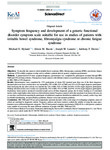Symptom frequency and development of a generic functional disorder symptom scale suitable for use in studies with IBS, FMS or CFS patients.
| dc.contributor.author | Hyland, Michael | |
| dc.contributor.author | Bacon, Alison | |
| dc.contributor.author | Lanario, Joseph | |
| dc.contributor.author | Davies, A | |
| dc.date.accessioned | 2019-06-28T10:08:09Z | |
| dc.date.issued | 2019-06-24 | |
| dc.identifier.issn | 2095-882X | |
| dc.identifier.issn | 2589-0514 | |
| dc.identifier.uri | http://hdl.handle.net/10026.1/14484 | |
| dc.description.abstract |
<jats:title>Abstract</jats:title><jats:sec><jats:title>Objectives</jats:title><jats:p>To describe the extent to which irritable bowel syndrome (IBS), fibromyalgia syndrome (FMS), and chronic fatigue syndrome (CFS) exhibit symptom overlap, and to validate a patient‐derived, generic symptom questionnaire.</jats:p></jats:sec><jats:sec><jats:title>Methods</jats:title><jats:p>A patient‐derived 61‐item symptom‐frequency questionnaire was completed by participants recruited through IBS, FMS and CFS self‐help websites. Principal axis factor analysis with oblimin rotation was performed separately for those reporting an IBS, FMS or CFS diagnosis.</jats:p></jats:sec><jats:sec><jats:title>Results</jats:title><jats:p>Questionnaires were completed by 1751 participants of whom 851 reported more than one of the three diagnoses. Stomach pain on at least a weekly basis was reported by 79% of IBS, 52% of FMS, and 43% of CFS single diagnosis participants. Pain increasing the day after activity was reported by 32% of IBS, 94% of FMS, and 85% of CFS single diagnosis participants. Waking still tired at least once weekly was reported by 75% of IBS, 97% of FMS, and 95% of CFS single diagnosis participants. Exploratory factor analysis produced consistent results across all three diagnostic groups, the 61 items loading on 12 correlated factors with a single higher order factor on which all items loaded. Frequency analysis led to the rejection of one item (cold sores on or near lips), and freeform reporting by participants of additional symptoms identified an additional five, namely, restless legs, hair loss/brittle hair/thinning, dizziness/balance problems, blurred vision and urination problems.</jats:p></jats:sec><jats:sec><jats:title>Conclusions</jats:title><jats:p>IBS, FMS and CFS are polysymptomatic spectrum disorders with a wide range of overlapping symptoms, many of which are unrelated to diagnostic criteria. Frequency analysis and factor analysis confirm the validity of using the same questionnaire across different diagnostic categories. The 65‐item general symptom questionnaire (GSQ‐65) is a valid generic symptom scale suitable for assessing the many different symptoms of people with IBS, FMS and CFS.</jats:p></jats:sec> | |
| dc.format.extent | 129-138 | |
| dc.format.medium | Electronic-eCollection | |
| dc.language | en | |
| dc.language.iso | en | |
| dc.publisher | KeAi | |
| dc.subject | Chronic fatigue syndrome | |
| dc.subject | Fibromyalgia | |
| dc.subject | Functional disorder | |
| dc.subject | Irritable bowel syndrome | |
| dc.subject | Symptom measurement | |
| dc.title | Symptom frequency and development of a generic functional disorder symptom scale suitable for use in studies with IBS, FMS or CFS patients. | |
| dc.type | journal-article | |
| dc.type | Journal Article | |
| plymouth.author-url | https://www.ncbi.nlm.nih.gov/pubmed/31367702 | |
| plymouth.issue | 2 | |
| plymouth.volume | 5 | |
| plymouth.publication-status | Published | |
| plymouth.journal | Chronic Diseases and Translational Medicine | |
| dc.identifier.doi | 10.1016/j.cdtm.2019.05.003 | |
| plymouth.organisational-group | /Plymouth | |
| plymouth.organisational-group | /Plymouth/Faculty of Health | |
| plymouth.organisational-group | /Plymouth/Faculty of Health/School of Psychology | |
| plymouth.organisational-group | /Plymouth/REF 2021 Researchers by UoA | |
| plymouth.organisational-group | /Plymouth/REF 2021 Researchers by UoA/UoA04 Psychology, Psychiatry and Neuroscience | |
| plymouth.organisational-group | /Plymouth/REF 2021 Researchers by UoA/UoA04 Psychology, Psychiatry and Neuroscience/UoA04 REF peer reviewers | |
| plymouth.organisational-group | /Plymouth/Research Groups | |
| plymouth.organisational-group | /Plymouth/Research Groups/Centre for Brain, Cognition and Behaviour (CBCB) | |
| plymouth.organisational-group | /Plymouth/Research Groups/Centre for Brain, Cognition and Behaviour (CBCB)/Behaviour | |
| plymouth.organisational-group | /Plymouth/Research Groups/FoH - Community and Primary Care | |
| plymouth.organisational-group | /Plymouth/Research Groups/Plymouth Institute of Health and Care Research (PIHR) | |
| plymouth.organisational-group | /Plymouth/Users by role | |
| plymouth.organisational-group | /Plymouth/Users by role/Academics | |
| dc.publisher.place | United States | |
| dcterms.dateAccepted | 2019-05-22 | |
| dc.rights.embargodate | 2019-7-5 | |
| dc.identifier.eissn | 2589-0514 | |
| dc.rights.embargoperiod | Not known | |
| rioxxterms.versionofrecord | 10.1016/j.cdtm.2019.05.003 | |
| rioxxterms.licenseref.uri | http://www.rioxx.net/licenses/all-rights-reserved | |
| rioxxterms.licenseref.startdate | 2019-06-24 | |
| rioxxterms.type | Journal Article/Review |


